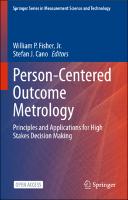Person-Centered Outcome Metrology
Principles and Applications for High Stakes Decision Making
| dc.contributor.editor | Fisher, Jr. | |
| dc.contributor.editor | Cano, Stefan J. | |
| dc.date.accessioned | 2022-12-13T12:34:40Z | |
| dc.date.available | 2022-12-13T12:34:40Z | |
| dc.date.issued | 2023 | |
| dc.identifier | ONIX_20221213_9783031074653_18 | |
| dc.identifier.uri | https://library.oapen.org/handle/20.500.12657/60145 | |
| dc.description.abstract | This unique collection of chapters from world experts on person-centered outcome (PCO) measures addresses the following critical questions: Can individual experiences be represented in measurements that do not reduce unique differences to meaningless uniformity? How person-centric are PCO measures? Are PCO measurements capable of delivering the kind of quality assured quantification required for high-stakes decision making? Are PCO measures likely to support improved health care delivery? Have pivotal clinical studies failed to deliver treatments for diseases because of shortcomings in the PCO measures used? Are these shortcomings primarily matters of precision and meaningfulness? Or is the lack of common languages for communicating outcomes also debilitating to quality improvement, research, and the health care economy? Three key issues form an urgent basis for further investigation. First, the numbers generated by PCO measures are increasingly used as the central dependent variables upon which high stakes decisions are made. The rising profile of PCO measures places new demands for higher quality information from scale and test construction, evaluation, selection, and interpretation. Second, PCO measurement science has well-established lessons to be learned from those who have built and established the science over many decades. Finally, the goal in making a PCO measurement is to inform outcome management. As such, it is vitally important that key stakeholders understand that, over the last half century, developments in psychometrics have refocused measurement on illuminating clinically important individual differences in the context of widely reproduced patterns of variation in health and functioning, comparable scale values for quality improvement, and practical explanatory models. This book’s audience includes anyone interested in person-centered care, including healthcare researchers and practitioners, policy makers, pharmaceutical industry representatives, clinicians, patient advocates, and metrologists. This is an open access book. | |
| dc.language | English | |
| dc.relation.ispartofseries | Springer Series in Measurement Science and Technology | |
| dc.subject.classification | thema EDItEUR::P Mathematics and Science::PD Science: general issues::PDD Scientific standards, measurement etc | en_US |
| dc.subject.classification | thema EDItEUR::M Medicine and Nursing::MB Medicine: general issues::MBG Medical equipment and techniques | en_US |
| dc.subject.classification | thema EDItEUR::J Society and Social Sciences::JM Psychology::JMB Psychological methodology::JMBT Psychological testing and measurement | en_US |
| dc.subject.classification | thema EDItEUR::M Medicine and Nursing::MB Medicine: general issues::MBP Health systems and services::MBPM Medical administration and management | en_US |
| dc.subject.other | patient-centered outcomes | |
| dc.subject.other | psychometrics | |
| dc.subject.other | health measurement | |
| dc.subject.other | social measurement | |
| dc.subject.other | clinical outcome assessments | |
| dc.subject.other | patient reported outcomes | |
| dc.title | Person-Centered Outcome Metrology | |
| dc.title.alternative | Principles and Applications for High Stakes Decision Making | |
| dc.type | book | |
| oapen.identifier.doi | 10.1007/978-3-031-07465-3 | |
| oapen.relation.isPublishedBy | 6c6992af-b843-4f46-859c-f6e9998e40d5 | |
| oapen.relation.isbn | 9783031074653 | |
| oapen.imprint | Springer | |
| oapen.pages | 402 | |
| oapen.place.publication | Cham |

